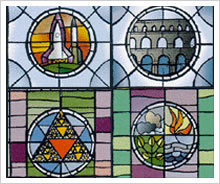First Year Engineering Tips
Here are some tips for first year engineering students adapted from the article "Surviving Engineering School" from Richard M. Felder, North Carolina State University, Chem. Engineering Education, 37(1), 30–31 (2003).
1. Go to Class
Attendance is important, but so is participation. Pay attention in class and ask questions when you don't understand something. Chances are someone else has the same question.
2. Use Office Hours
Visiting Professors and T.A.'s during office hours allows you to ask questions and get clarification on assignments.Could you give an example of how you would use that formula?" "Could you sketch what that (device, solution, plot) might look like?" "Where did that equation you just wrote come from? Never ask your instructor for help on a problem until you have made a serious effort to solve it by yourself.
3. Study with a group
Working with others helps you ask questions and figure things out. Studying together with peers can show you ways to solve problems. Outline problem solutions by yourself first and then work out the details in your group. Get group members—especially the weaker ones—to explain all completed problem solutions before ending a problem-solving session.
4. Do your Homework
Completing your homework on time help you prepare for exams. If you are having difficulty, seek out help from a tutor or T.A. Start early: waiting until two days before the final exam probably won’t cut it.
5. Use the Engineering Library (scan your ID to use the library 24 hrs.) http://engineering.library.nd.edu/
6. Math Library Tutors are available to help you with any type of math.
http://mathematics.library.nd.edu/about/tutors.shtml
7. Find a good study spot
There are lots of great places to study on campus, but branch libraries like Engineering, Math, and Chemistry Physics are favorites for being quiet places. The lower level of Hesburgh is also nice and quiet!
8. Make an exam schedule
Don't stress about tests! Make a calendar of exams and study for one at a time.
9. Ask questions
If you can't figure something out on your own, seek out an expert. Professors, grad students, librarians, or professional engineers can be a great resource for students.
10. Believe in yourself!

